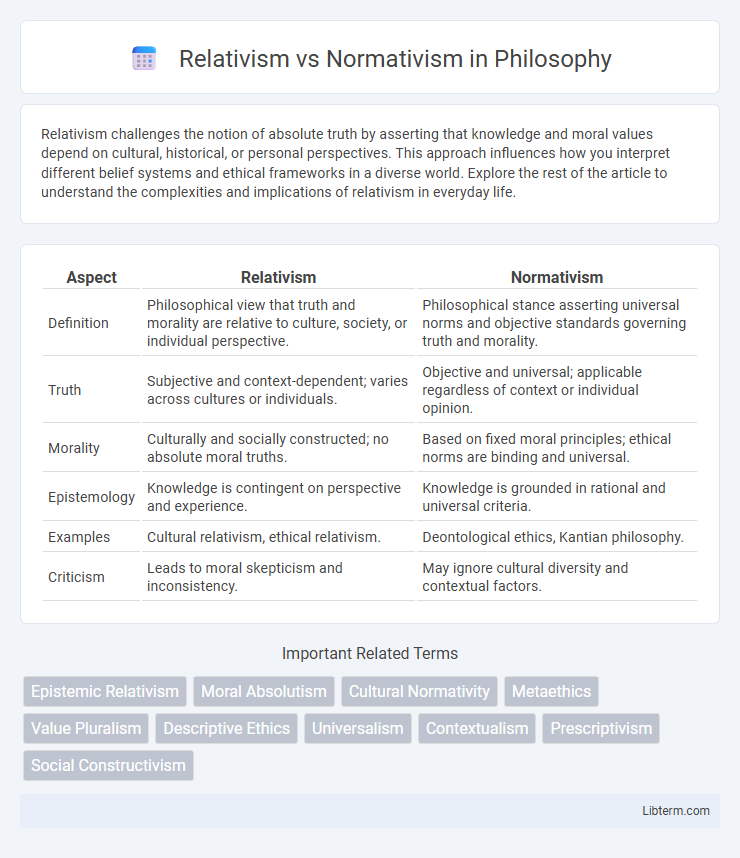Relativism challenges the notion of absolute truth by asserting that knowledge and moral values depend on cultural, historical, or personal perspectives. This approach influences how you interpret different belief systems and ethical frameworks in a diverse world. Explore the rest of the article to understand the complexities and implications of relativism in everyday life.
Table of Comparison
| Aspect | Relativism | Normativism |
|---|---|---|
| Definition | Philosophical view that truth and morality are relative to culture, society, or individual perspective. | Philosophical stance asserting universal norms and objective standards governing truth and morality. |
| Truth | Subjective and context-dependent; varies across cultures or individuals. | Objective and universal; applicable regardless of context or individual opinion. |
| Morality | Culturally and socially constructed; no absolute moral truths. | Based on fixed moral principles; ethical norms are binding and universal. |
| Epistemology | Knowledge is contingent on perspective and experience. | Knowledge is grounded in rational and universal criteria. |
| Examples | Cultural relativism, ethical relativism. | Deontological ethics, Kantian philosophy. |
| Criticism | Leads to moral skepticism and inconsistency. | May ignore cultural diversity and contextual factors. |
Understanding Relativism: Key Concepts
Relativism posits that moral principles and truths are not absolute but vary according to cultural, historical, or individual contexts, emphasizing the importance of perspective in ethical evaluation. Central to understanding relativism is its rejection of universal norms, promoting tolerance and pluralism by recognizing diverse value systems without imposing a single standard. Key concepts include cultural relativism, which examines morality within societal frameworks, and subjectivism, which focuses on individual moral judgments, both challenging normative claims of objectivity in ethics.
Defining Normativism: Principles and Foundations
Normativism asserts that moral and legal principles are grounded in objective norms that guide human behavior, emphasizing universal standards and duties rather than subjective preferences. It holds that ethical rules and laws derive their authority from rational justifications and foundational moral truths, independent of social conventions or individual beliefs. This framework supports the establishment of consistent, binding guidelines that regulate conduct within societies and legal systems.
Historical Overview: Origins of Relativism and Normativism
Relativism emerged prominently in ancient Greek philosophy, with Protagoras asserting that "man is the measure of all things," highlighting subjective truth based on individual perception. Normativism traces its origins to Immanuel Kant's critical philosophy, emphasizing universal moral laws grounded in reason and duty. The historical debate centers on whether ethical principles are culturally contingent or universally binding.
Major Philosophers and Influential Thinkers
Relativism, prominently advocated by Friedrich Nietzsche and Michel Foucault, emphasizes the variability of truth and moral values across cultures and historical periods, challenging universal standards. Normativism, supported by Immanuel Kant and John Rawls, asserts the existence of objective moral principles and universal norms governing ethical behavior and justice. These contrasting views shape contemporary debates on morality, law, and epistemology by balancing cultural diversity against foundational ethical frameworks.
Relativism vs Normativism: Core Differences
Relativism emphasizes that moral principles and truth vary according to cultural, individual, or situational contexts, rejecting absolute standards. Normativism asserts the existence of universal norms and objective criteria that guide ethical judgments and behavior across all contexts. The core difference lies in relativism's flexibility and contextual dependence versus normativism's commitment to fixed, universally applicable moral rules.
Ethical Implications in Moral Philosophy
Relativism in moral philosophy emphasizes the variability of ethical norms according to cultural, societal, or individual perspectives, challenging the existence of absolute moral standards. Normativism advocates for universal ethical principles that apply across contexts, providing a stable foundation for evaluating right and wrong. The ethical implications impact conflict resolution, legal frameworks, and cross-cultural dialogue, as relativism fosters tolerance but risks moral ambiguity, whereas normativism promotes consistency but may impose ethnocentric bias.
Impact on Cultural and Social Perspectives
Relativism emphasizes the variability of cultural norms and moral values based on context, promoting tolerance and understanding of diverse social practices. Normativism asserts the existence of universal standards, shaping societies by providing clear ethical guidelines and fostering social cohesion. The tension between these approaches profoundly influences debates on multiculturalism, human rights, and legal systems worldwide.
Criticisms and Challenges of Each Approach
Relativism faces criticism for potentially leading to moral nihilism, as it rejects universal ethical standards and risks justifying harmful practices based on cultural differences. Normativism is challenged for its rigidity in applying fixed moral principles, which can overlook cultural diversity and contextual nuances in ethical decision-making. Both approaches struggle to balance respect for individual or cultural variation with the need for consistent moral guidance.
Practical Applications in Contemporary Issues
Relativism emphasizes context-dependent ethical decisions, influencing debates on cultural practices and human rights by promoting tolerance and understanding of diverse value systems. Normativism advocates for universal principles guiding judgments, shaping legal frameworks, and policy-making to ensure consistency and fairness across different societies. The practical application of these theories appears in cross-cultural negotiations, international law, and bioethical discussions where balance between cultural specificity and universal norms is critical.
Future Directions and Ongoing Debates
Future directions in the debate between relativism and normativism emphasize advancing cross-cultural dialogue and refining ethical frameworks to better accommodate global diversity. Researchers explore integrating normativist principles with relativist insights to foster adaptable yet universally resonant moral standards, balancing contextual specificity with overarching norms. Ongoing debates concentrate on resolving tensions between moral pluralism and the pursuit of objective ethical criteria, impacting fields such as international law, human rights, and multicultural policy development.
Relativism Infographic

 libterm.com
libterm.com